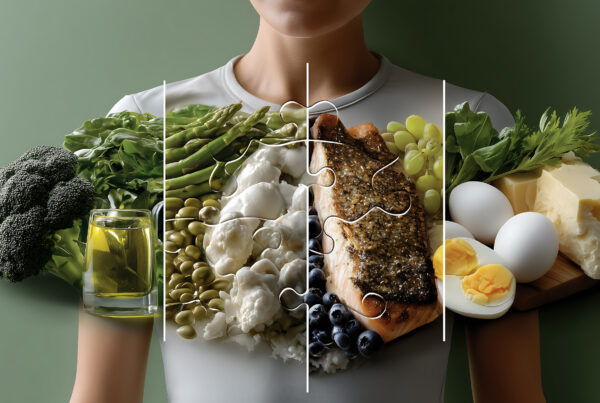”Question: What foods are healthy for my heart?
Reading time: 8 Minutes
MWi Hack:
- Heart-healthy foods encompass a variety of minimally processed vegetables, fruits, whole grains, and lean proteins, recommended by the American Heart Association to maintain cardiovascular health, while emphasizing dietary patterns like the DASH and Mediterranean diets as optimal choices.
MWi Summary:
- Heart-healthy dietary patterns are crucial for cardiovascular health, influencing blood pressure, inflammation, cholesterol levels, and triglycerides.
- Emphasizing minimally processed vegetables, fruits, whole grains, beans, lean proteins, and healthy fats is key for heart health.
- Foods rich in antioxidants, fiber, omega-3 fatty acids, and unsaturated fats are particularly beneficial for heart health.
- Avoiding foods high in sodium, saturated fats, added sugars, and alcohol is important for maintaining heart health.
- The DASH diet and Mediterranean diet are highlighted as top choices for promoting heart health due to their emphasis on whole foods and balanced nutrition.
What are heart-healthy foods?
Beyond individual foods or nutrients, heart-healthy dietary patterns can significantly boost your cardiovascular health. What you eat can influence many aspects of heart health, including blood pressure, inflammation, cholesterol levels, and triglycerides.
A heart-healthy eating style emphasizes minimally processed vegetables, fruits, whole grains, and beans. The American Heart Association (AHA) recommends the following dietary guidelines for heart health:
- Maintain a healthy body weight by keeping calories from food balanced with calories burned exercising.
- Consume a wide variety of fruits and vegetables.
- Choose mostly whole grains instead of refined grains.
- Use liquid plant oils such as olive oil rather than tropical oils such as palm oil.
- Eat healthy sources of protein, such as from plants, seafood, or lean meats.
- Minimize added sugars and salt.
- Limit alcohol.
- Choose minimally processed foods.
Protect yourself from the damage of chronic inflammation.
Science has proven that chronic, low-grade inflammation can turn into a silent killer that contributes to cardiovascular disease, cancer, type 2 diabetes and other conditions. Get simple tips to fight inflammation and stay healthy — from Harvard Medical School experts.
Heart-healthy foods list
Fruits and vegetables; whole grains; healthy proteins; nonfat and low-fat dairy; and unsaturated fats and oils are the foundation of a heart-healthy eating plan.
Fruits and vegetables
Studies consistently find that diets rich in fruits and vegetables are associated with reduced risk of cardiovascular disease. Fruits and vegetables play an important role in heart health because they contain antioxidants that can help prevent injuries to the arteries. Aim to eat a variety of fruits and vegetables — fresh, canned, or frozen.
- Aim to get as many colors of vegetables as possible into your daily diet. Choose tomatoes, peppers, edamame, beets, and carrots.
- Leafy greens such as kale, spinach, and bok choy are packed with vitamins, minerals, and antioxidants, which can help lower blood pressure and reduce the risk of heart disease. Leafy greens are rich in nitrates, which help to relax and widen blood vessels. Research has found that people who ate the most nitrate-rich vegetables (especially leafy greens) lowered their risk of cardiovascular disease by 12% to 26%.
- Opt for canned vegetables that are low in sodium.
- Look for frozen vegetables without added butter or sauces.
- Focus on fresh fruits like berries, apples, oranges, bananas, mangoes, guava, and papaya. Berries like strawberries and blueberries are also excellent for heart health, as they are packed with antioxidants, which protect against oxidative stress and inflammation that can contribute to the development of heart disease. Studies associate regular, moderate intake of blueberries with reduced risk of cardiovascular disease.
- Choose canned, frozen, or dried fruit without added sugars.
Whole grains
Whole grains are a rich source of fiber. Fiber helps maintain healthy cholesterol levels, reducing the risk of heart disease. Studies have found that replacing refined grains with whole grains can lower your risk of coronary heart disease.
Try incorporating these whole grains into your diet:
- whole-grain bread, bagels, English muffins, and tortillas
- whole-grain hot or cold breakfast cereals
- brown or wild rice, quinoa, or oats
- whole-wheat pasta and couscous.
Healthy proteins
Plant-based proteins such as legumes, nuts, and fish are excellent heart-healthy protein choices. These foods are associated with lower cardiovascular disease risks.
- Legumes are high in fiber, protein, and antioxidants. Soybeans (including edamame and tofu), other beans, lentils, chickpeas, and split peas are common types of legumes. Legumes promote heart health by reducing cholesterol and improving blood pressure. Studies have found that higher intake of legumes lowers cardiovascular disease risk.
- Nuts are rich in fiber, polyunsaturated fats, and protein. Studies have found that higher nut intake can lead to lower risk of cardiovascular disease, coronary heart disease, and stroke.
- Oily fish such as salmon, mackerel, and sardines are rich in omega-3 fatty acids, which are known to reduce the risk of heart disease. Omega-3 fatty acids can help ward off damaging inflammation inside the body. Studies have shown that consuming two to three servings of fish per week is associated with a lower incidence of cardiovascular disease, coronary heart disease, myocardial infarction, stroke, and heart failure than fewer weekly servings of fish.
- For other types of meat, opt for lean meats and avoid processed meats. Lean meats include 95% lean ground beef, pork tenderloin, or skinless chicken or turkey.
Nonfat and low-fat dairy
Replacing full-fat dairy products with nonfat and low-fat dairy products is a heart-healthy decision that helps increase unsaturated fat intake while lowering intake of saturated fat. Unsaturated fats are associated with better cardiovascular health. Some low-fat dairy options:
- fat-free or low-fat (1%) milk
- fat-free or low-fat plain yogurt
- fat-free or low-fat cheese or cottage cheese
- fortified soy beverages (soy milk) or soy yogurt.
Unsaturated fats and oils
Try to replace saturated fats in your diet with foods that have healthier unsaturated fats. Unsaturated fats can be found in seafood, nuts, seeds, avocados, and oils.
- Healthy oils for cooking are high in monounsaturated and polyunsaturated fats, which are best for heart health.
- Dietary sources of polyunsaturated fat include plant oils such as soybean, corn, safflower, and sunflower oils.
- Major plant sources of monounsaturated fat include canola and olive oils, and high oleic acid safflower and sunflower oils. Olive oil, in particular, is packed with monounsaturated fatty acids. Extra virgin olive oil is also rich in antioxidants, which can help prevent damage to your body, including your arteries.
- Avocado is a heart-healthy food that is abundant in healthy fats, fiber, and several micronutrients that are associated with cardiovascular health. In one study, eating at least two servings of avocado each week lowered the risk of experiencing a heart attack or related problem due to coronary artery disease by 21%.
Foods to avoid for heart health
Just as certain foods can benefit your heart health and lower your risk of heart disease, some foods, such as those with high levels of sodium (salt), saturated fat, added sugars, and alcohol, should be avoided to protect heart health. Poor diet quality is associated with an elevated risk of cardiovascular disease.
The AHA recommends avoiding these foods for ideal heart health:
- high-fat dairy products
- fatty meats
- processed meats
- tropical oils and partially hydrogenated fats
- processed foods
- foods and beverages with added sugars
- food high in sodium
- alcohol.
Best diets for heart disease
Incorporating heart-healthy foods into your diet can provide a wide range of benefits for your heart. Making these foods part of a balanced diet that you will stick with, along with other heart-healthy habits such as regular exercise and stress management, is crucial for overall well-being.
With so many diets and eating plans to choose from, it can be confusing to know which one to follow. The AHA looked at 10 popular diets or eating patterns to evaluate how each aligns with the AHA’s dietary guidance for heart-healthy eating. Their findings: Some diets promote heart health better than others. Two of these diets — the DASH diet and the Mediterranean diet — stand out as the top diets for heart health.
DASH diet
The DASH diet is also called the Dietary Approaches to Stop Hypertension eating plan. Studies have found associations between the DASH diet and better heart health, including a lower risk of heart failure and reduced blood pressure.
The DASH diet is based on eating plenty of fresh fruits and vegetables, and choosing lean proteins, low-fat dairy, beans, nuts, and vegetable oils, while limiting sweets and foods high in saturated fats.
Mediterranean diet
A Mediterranean-style diet is a plant-based diet influenced by countries bordering the Mediterranean Sea. It is a popular diet that is touted for its health benefits, including a lower risk of heart disease.
A Mediterranean-style diet emphasizes vegetables, fruits, whole grains, beans, and legumes and includes low-fat or fat-free dairy products, fish, poultry, certain vegetable oils, and nuts. The diet limits added sugars, sugary beverages, sodium, highly processed foods, refined carbohydrates, saturated fats, and fatty or processed meats.
MWi would like to thank Jenette Restivo for sharing these insights with our community. Click the button below to go to the original article:






